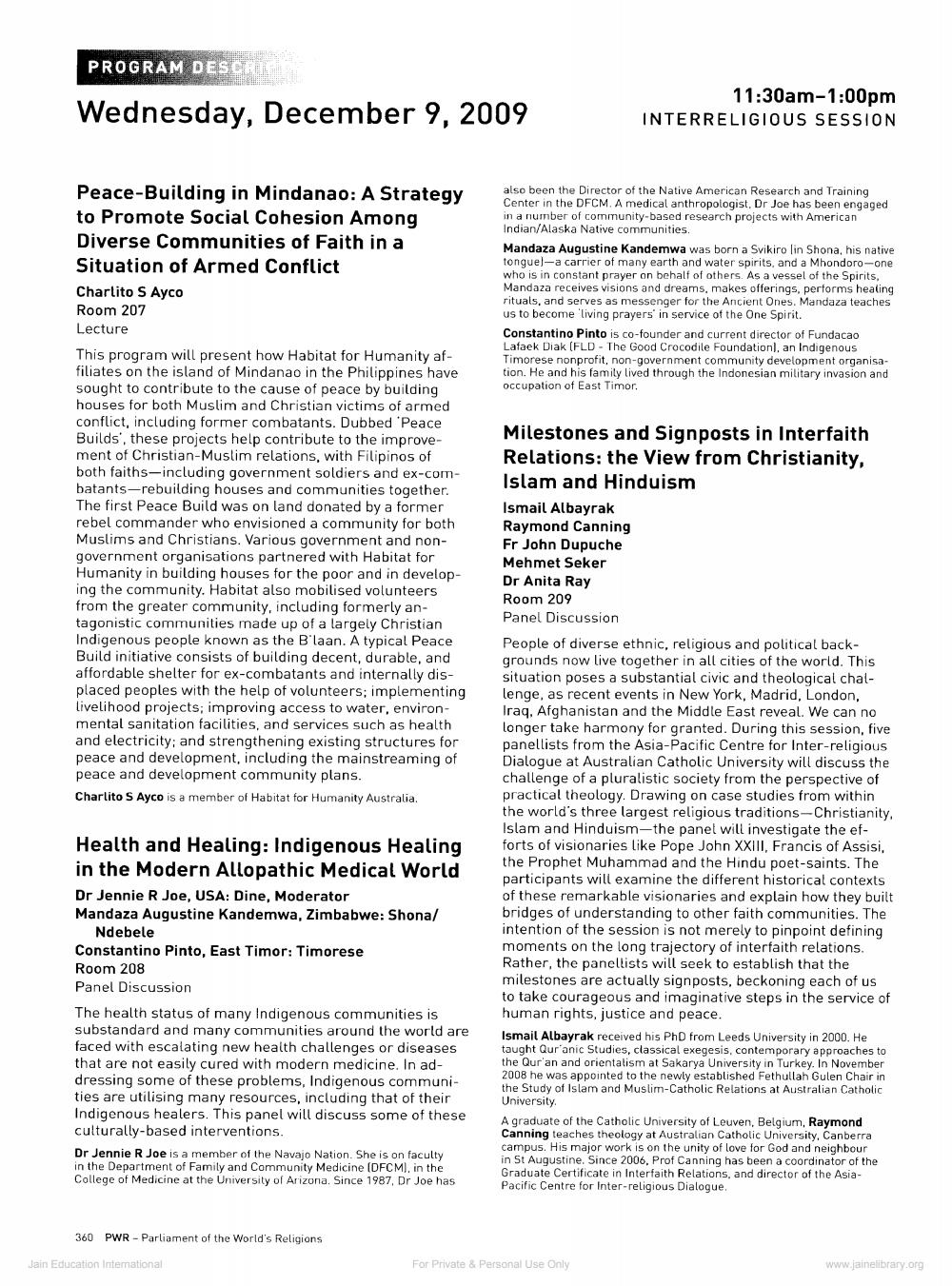________________
PROGRAM DESC Wednesday, December 9, 2009
11:30am-1:00pm INTERRELIGIOUS SESSION
also been the Director of the Native American Research and Training Center in the DFCM. A medical anthropologist, Dr Joe has been engaged in a number of community-based research projects with American Indian/Alaska Native communities. Mandaza Augustine Kandemwa was born a Svikiro lin Shona, his native tongue)-a carrier of many earth and water spirits, and a Mhondoro-one who is in constant prayer on behalf of others. As a vessel of the Spirits, Mandaza receives visions and dreams, makes offerings, performs healing rituals, and serves as messenger for the Ancient Ones. Mandaza teaches us to become living prayers in service of the One Spirit. Constantino Pinto is co-founder and current director of Fundacao Lafaek Diak (FLD - The Good Crocodile Foundation, an Indigenous Timorese nonprofit, non-government community development organisation. He and his family lived through the Indonesian military invasion and occupation of East Timor.
Peace-Building in Mindanao: A Strategy to Promote Social Cohesion Among Diverse Communities of Faith in a Situation of Armed Conflict Charlito S Ayco Room 207 Lecture This program will present how Habitat for Humanity affiliates on the island of Mindanao in the Philippines have sought to contribute to the cause of peace by building houses for both Muslim and Christian victims of armed conflict, including former combatants. Dubbed 'Peace Builds, these projects help contribute to the improvement of Christian-Muslim relations, with Filipinos of both faiths-including government soldiers and ex-combatants-rebuilding houses and communities together. The first Peace Build was on land donated by a former rebel commander who envisioned a community for both Muslims and Christians. Various government and nongovernment organisations partnered with Habitat for Humanity in building houses for the poor and in developing the community. Habitat also mobilised volunteers from the greater community, including formerly antagonistic communities made up of a largely Christian Indigenous people known as the Blaan. A typical Peace Build initiative consists of building decent, durable, and affordable shelter for ex-combatants and internally displaced peoples with the help of volunteers; implementing livelihood projects; improving access to water, environmental sanitation facilities, and services such as health and electricity, and strengthening existing structures for peace and development, including the mainstreaming of peace and development community plans. Charlito S Ayco is a member of Habitat for Humanity Australia,
Milestones and Signposts in Interfaith Relations: the View from Christianity, Islam and Hinduism Ismail Albayrak Raymond Canning Fr John Dupuche Mehmet Seker Dr Anita Ray Room 209 Panel Discussion People of diverse ethnic, religious and political backgrounds now live together in all cities of the world. This situation poses a substantial civic and theological challenge, as recent events in New York, Madrid, London, Iraq, Afghanistan and the Middle East reveal. We can no longer take harmony for granted. During this session, five panellists from the Asia-Pacific Centre for Inter-religious Dialogue at Australian Catholic University will discuss the challenge of a pluralistic society from the perspective of practical theology. Drawing on case studies from within the world's three largest religious traditions-Christianity, Islam and Hinduism-the panel will investigate the efforts of visionaries like Pope John XXII, Francis of Assisi, the Prophet Muhammad and the Hindu poet-saints. The participants will examine the different historical contexts of these remarkable visionaries and explain how they built bridges of understanding to other faith communities. The intention of the session is not merely to pinpoint defining moments on the long trajectory of interfaith relations. Rather, the panellists will seek to establish that the milestones are actually signposts, beckoning each of us to take courageous and imaginative steps in the service of human rights, justice and peace. Ismail Albayrak received his PhD from Leeds University in 2000. He taught Qur'anic Studies, classical exegesis, contemporary approaches to the Qur'an and orientalism at Sakarya University in Turkey. In November 2008 he was appointed to the newly established Fethullah Gulen Chair in the Study of Islam and Muslim-Catholic Relations at Australian Catholic University. A graduate of the Catholic University of Leuven, Belgium, Raymond Canning teaches theology at Australian Catholic University, Canberra campus. His major work is on the unity of love for God and neighbour in St Augustine. Since 2006, Prof Canning has been a coordinator of the Graduate Certificate in Interfaith Relations, and director of the AsiaPacific Centre for Inter-religious Dialogue.
Health and Healing: Indigenous Healing in the Modern Allopathic Medical World Dr Jennie R Joe, USA: Dine, Moderator Mandaza Augustine Kandemwa, Zimbabwe: Shona/
Ndebele Constantino Pinto, East Timor: Timorese Room 208 Panel Discussion The health status of many Indigenous communities is substandard and many communities around the world are faced with escalating new health challenges or diseases that are not easily cured with modern medicine. In addressing some of these problems, Indigenous communities are utilising many resources, including that of their Indigenous healers. This panel will discuss some of these culturally-based interventions. Dr Jennie R Joe is a member of the Navajo Nation. She is on facul in the Department of Family and Community Medicine (DFCM), in the College of Medicine at the University of Arizona. Since 1987, Dr Joe has
360 PWR - Parliament of the World's Religions
Jain Education International
For Private & Personal use only
www.jainelibrary.org




